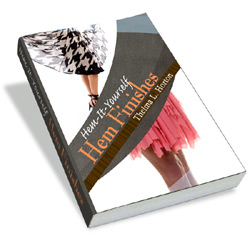|
Instantly
Receive FREE !
My
Personal Sewing Room Inspirational Photos to Help You
"SET-UP YOUR
SEWING SPACE"
|
|
|
|
Discover How to Select the Most Flattering Colors to Sew Your Own
Clothes
Avoid
the mistakes
that most people make when choosing their best fashion colors
that flatter your
garment and add pop to your design. Before any details are
noticed, the first thing anyone notices about the garment is color.
Some colors are:
- cheering
- compelling
- vivacious
- frivolous
- active
- fun
Other
colors are:
- restful
- serene
- relaxed
- subtle
- dignified
Some
colors lift our spirits, others subdue them; they can be soft and
fresh or brassy and bold. It
is not merely by chance that you may reach into the closet for your
brightest dress on a rainy day, or slip into a pastel gown to relax
after a hectic day.
Color is one of the most powerful influential elements to consider that
have an effect on the figure size. It can affect mood and
emotions. Sometimes it can draw attention or seem to retreat
into
the background. Color can appear to advance and look larger.
It can recede and look smaller and farther away.
If you have an understanding of the basic color concepts, you will find
out what color can do for you, and how to apply it when selecting your
fabric. Too often, we make a choice merely by whim, personal
preference, or simple prejudice in color selection and not enough of
what looks best on us. Always take your peronal coloring into
consideration.
Before you buy any fabric:
- Hold up different
color swatches to your face and
take a long thoughtful look into the mirror
- Ask yourself or a
friend: how does the swatch
relate to the color of your hair, eyes, and complexion?
- Is it flattering?
- Look at your current
wardrobe to decide which colors
coordinate best
- Put briight colors on
or near your best features,
because the draw attention
- Study the current
fashion trends making note of
prominent colors, color combinations, and fabrics.
This
will make you feel and look up to date.
Allow
yourself to
experiment
with color. Don't restrict yourself to any one group of
colors.
Learn to enjoy and use many. Don't be afraid of new colors or
let
yourself be boxed into a one-color wardrobe.
Your goal is to combine style, fabrics and flattering
colors that accentuate the lines of your sewing pattern and
enhance your assets.
To help you remember what effect you can expect from colors,
they can be divided into different categories:
-
Bright
reds, yellows, and oranges
– the intense colors of flames, fire, and sunlight
– are
warm or advancing colors. They usually look and seem warmer, brighter
and larger. These colors always make a figure appear larger.
-
Cool
colors -
blues, greens, violets - colors of water, trees, grass, and mountain
shadows are cool or receding colors. They look calmer, cooler, and have
a slimming effect.
-
Dark
colors recede,
reducing apparent figure size; light colors advance, creating the
opposite impression.
- Black,
dull, and dark colors absorb light
and appear farther
away or smaller. They also outline the body and can emphasize body
contour
Colors
also vary in brightness and lightness or darkness.
-
Tints
of colors are made by adding white to the pure color. The more white a
color has added to it, the lighter it will be.
-
Shades
of colors are made by adding black to the pure color. The more black
added, the darker the shade will be.
If you wish to make
a figure or part of it look smaller, use black, dull or receding
colors. On the other hand, if you wish to enlarge or draw attention to
a figure or part of it, use white, bright, light, or warm colors.
For
example, a woman with narrow shoulders, a small bust, and large hips
could help balance her proportions by wearing a dark – or
dull-colored skirt or pants with a bright – or light-colored
blouse or jacket. A woman with a generally heavy figure but a beautiful
face could make her figure look more slender by wearing darker and
grayed colors. She could draw attention to her beautiful face
by wearing a
white or brightly colored scarf, collar, or necklace.
Generally,
concentrate on bright, light, and warm colors on areas to be
emphasized. Use dark, dull, and cool colors on areas to be hidden.
The color of the
skin is more important than the color of the hair or eyes in choosing
colors that are becoming. People change hair color and even use colored
contacts to brighten the color of their eyes. Skin tones, too, can be
changed by sun tan, different shades and types of make-up, or age. Skin
constantly reflects the colors of the clothes worn near it.
Remember though,
colors look different in different kinds of light. If you are helping
to select a garment to be worn in daylight or bright sunlight, be sure
to check it in bright daylight. That is, look at the person with the
color held close to the face to see how it affects the complexion. Use
the kind of light in which the garment will usually be worn.
Look closely at the
skin. Does it look too white, too pink, too yellow, or too ash grey?
Then try another color or another shade or tint of the color you had.
Does it make the skin look attractive? If so, that could be a good
color for the individual.
Practice this with
all your own clothing. Observe your friends in the colors they wear.
Notice people on the streets as you do your shopping. Become aware of
the effect colors have on the overall appearance of the person wearing
them, especially on the skin, hair, and eyes. What part of the figure
do the colors draw your attention to? Does the color enhance or detract
from the overall appearance of the wearer?
Once you acquire
the basics and you become more conscious of the use of color, you will
probably become more aware of the effect it has on your appearance.
Then you can help yourself and your clients, if you decide to
have any, make wise color choices.
If you’re
in doubt of what colors are the best for you, consider the
services
of a color consultant. Shop around to determine whether this is the
color consultant for you, ask for the names of some previous clients;
then be sure to talk with them. Find out how long
ago they consulted with this person about their colors, if they
followed the system, and how satisfied they were with the results.
For
more detailed
information on how to apply this information to your sewing project,
purchase a copy of my popular ebook, "Sew-It
Like a Pro".
For
a limited time you can download
And
2 FREE Bonus Books
 
for
the incredibly low price of $27 and have it downloaded
to your computer in seconds!
BUY
THEM NOW
|






